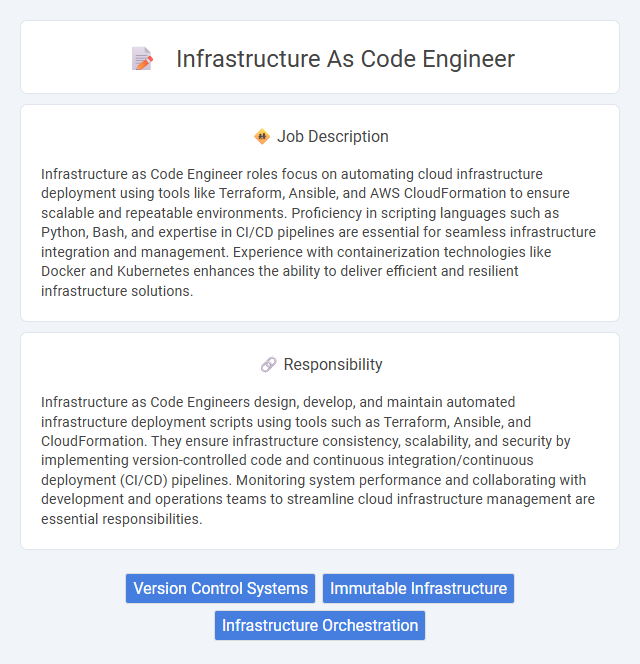
Infrastructure as Code Engineer roles focus on automating cloud infrastructure deployment using tools like Terraform, Ansible, and AWS CloudFormation to ensure scalable and repeatable environments. Proficiency in scripting languages such as Python, Bash, and expertise in CI/CD pipelines are essential for seamless infrastructure integration and management. Experience with containerization technologies like Docker and Kubernetes enhances the ability to deliver efficient and resilient infrastructure solutions.
Individuals with strong analytical skills and a passion for automation are likely to thrive as Infrastructure as Code Engineers. Those comfortable with coding, cloud technologies, and continuous integration/continuous deployment (CI/CD) pipelines may find this role particularly suitable. However, candidates who prefer less technical or hands-on roles might struggle to adapt to the demands of this position.
Qualification
Expertise in cloud platforms such as AWS, Azure, or Google Cloud is essential for an Infrastructure as Code Engineer role. Proficiency in automation tools like Terraform, Ansible, or CloudFormation enables seamless infrastructure deployment and management. Strong scripting skills in Python, Bash, or PowerShell combined with a solid understanding of DevOps principles and CI/CD pipelines are crucial qualifications.
Responsibility
Infrastructure as Code Engineers design, develop, and maintain automated infrastructure deployment scripts using tools such as Terraform, Ansible, and CloudFormation. They ensure infrastructure consistency, scalability, and security by implementing version-controlled code and continuous integration/continuous deployment (CI/CD) pipelines. Monitoring system performance and collaborating with development and operations teams to streamline cloud infrastructure management are essential responsibilities.
Benefit
Employing an Infrastructure as Code Engineer likely enhances deployment speed and reduces human error by automating infrastructure management. This role probably improves consistency and scalability across environments through standardized code-based configurations. Organizations may also benefit from increased collaboration between development and operations teams, leading to more efficient infrastructure changes.
Challenge
Infrastructure as Code Engineers likely face the challenge of managing complex cloud environments while ensuring consistent and reliable deployments. The role probably demands continuous learning to keep up with evolving automation tools and best practices. Navigating integration issues and troubleshooting infrastructure failures may frequently require strong problem-solving skills under pressure.
Career Advancement
Infrastructure as Code Engineers leverage automation tools such as Terraform, Ansible, and CloudFormation to streamline cloud infrastructure deployment, significantly enhancing operational efficiency. Mastery of CI/CD pipelines, container orchestration platforms like Kubernetes, and cloud providers including AWS, Azure, or Google Cloud positions professionals for rapid career progression toward senior DevOps or cloud architect roles. Continuous upskilling in emerging technologies and certifications like AWS Certified DevOps Engineer further accelerates advancement opportunities in the competitive cloud infrastructure domain.
Key Terms
Version Control Systems
An Infrastructure as Code Engineer utilizes Version Control Systems (VCS) such as Git to manage and track changes in infrastructure configurations, enabling collaboration and ensuring code integrity. Mastery of branching strategies, merge conflicts resolution, and automated CI/CD pipelines is essential for maintaining efficient and reliable deployment workflows. Proficiency in tools like GitHub, GitLab, or Bitbucket enables seamless integration of infrastructure code with development environments and supports continuous delivery practices.
Immutable Infrastructure
An Infrastructure as Code Engineer specializing in Immutable Infrastructure designs and implements automated environments where infrastructure components are never modified after deployment, ensuring consistency and stability. They utilize tools like Terraform, AWS CloudFormation, or Ansible to define infrastructure declaratively, enabling version-controlled and reproducible deployments. This approach minimizes configuration drift, enhances security, and supports continuous delivery pipelines in cloud-native and hybrid environments.
Infrastructure Orchestration
Infrastructure as Code Engineers specialize in automating infrastructure deployment and management using infrastructure orchestration tools like Terraform, Ansible, and Kubernetes. They streamline cloud resource provisioning, configuration, and scaling through declarative code, ensuring consistent and repeatable environments. Expertise in version control systems, CI/CD pipelines, and cloud platforms such as AWS, Azure, or Google Cloud enhances infrastructure reliability and operational efficiency.
 kuljobs.com
kuljobs.com